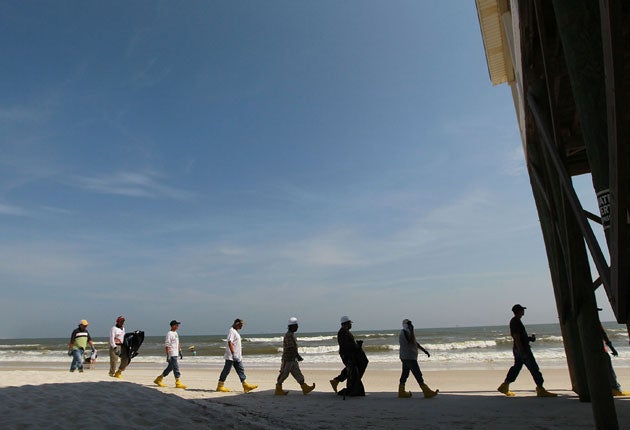BP boss defends company against Obama's attack
The US President calls for those behind the Gulf of Mexico oil spill to take full responsibility

Your support helps us to tell the story
From reproductive rights to climate change to Big Tech, The Independent is on the ground when the story is developing. Whether it's investigating the financials of Elon Musk's pro-Trump PAC or producing our latest documentary, 'The A Word', which shines a light on the American women fighting for reproductive rights, we know how important it is to parse out the facts from the messaging.
At such a critical moment in US history, we need reporters on the ground. Your donation allows us to keep sending journalists to speak to both sides of the story.
The Independent is trusted by Americans across the entire political spectrum. And unlike many other quality news outlets, we choose not to lock Americans out of our reporting and analysis with paywalls. We believe quality journalism should be available to everyone, paid for by those who can afford it.
Your support makes all the difference.Tony Hayward, the beleaguered boss of BP, was fighting a rearguard action yesterday after furious criticism from the US President Barack Obama, who accused BP of trying to pass the buck over the Gulf of Mexico oil disaster.
The BP chief executive had claimed the spill – which could yet end up as the biggest in the history of offshore exploration – was "tiny" by comparison with the amount of water in the area. Yesterday he insisted that it will not stop deep water oil exploration "in the same way as Apollo 13 did not stop the space programme, nor have serious airline accidents from time to time stopped people flying".
His comments came after President Obama attacked the "ridiculous spectacle" of BP and other oil companies failing to take responsibility during recent congressional hearings into the disaster. Speaking on Friday, Mr Obama said: "I will not tolerate more finger-pointing or irresponsibility... there is enough responsibility to go around. And all parties should be willing to accept it."
The President vowed: "I'm not going to rest or be satisfied until the leak is stopped at the source, the oil in the Gulf is contained and cleaned up, and the people of the Gulf are able to go back to their lives and their livelihoods."
Mr Hayward is under a fierce attack from campaigners who say his days must be numbered. Speaking to The Independent on Sunday yesterday, John Sauven, executive director of Greenpeace, said: "His job is on the line. I've never seen the head of an international company come under such a sustained attack from the President of the United States. The buck stops with him and he can duck and weave as much as he wants, but he's not going to get away with it." Mr Hayward described the environmental catastrophe as a "transforming event" that would result in significant changes to the oil industry.
Thousands of barrels of oil a day have been gushing from a seabed well since the Deepwater Horizon drilling rig exploded on 20 April, killing 11 workers. With a relentless stream of into the sea from a broken pipe nearly a mile below the surface, the spill has now grown to cover some 3,650 square miles of ocean.
BP technicians are racing against time in their latest efforts to stem the flow of oil, trying to use remote controlled robots to guide a mile-long tube into the breached well. If successful, this would allow them to funnel leaking oil up to a container vessel on the surface.
BP's chief executive admitted that there might be no immediate prospect of an end to the outflow, which has already resulted in estimates of between 210,000 gallons and 2.9 million gallons of oil a day escaping into waters off the US coastline. He said that, at best, the oil leak could be stopped in a week to 10 days, but that the worst case scenario was "more than that, and it's impossible to say how much more".
Mr Hayward did not mention that BP has given testimony to the US Congress that at worst, 60,000 barrels of oil a day could be lost, equivalent to a spill the size of the 1989 Exxon Valdez disaster every four days.
Responding to President Obama's condemnation of the "cosy relationship" between oil companies and regulators, he said: "The regulatory regime for the deep water offshore in the US is very rigorous – more rigorous than many other regimes – and the industry has had a very good track record."
He added that he had "no intention" of resigning, and said that no conclusions about responsibility for the disaster should be drawn until a formal investigation was completed.
Under fire
A British geologist who has been with BP for 28 years, Tony Hayward has tried to clean up a legacy of law suits arising from a major refinery fire in Texas and an oil spill in Alaska, since succeeding Lord Browne as chief executive in 2007. Here are some of the other controversies he has been embroiled in:
2007 Signalled his intention to abandon the "Beyond Petroleum" mantra of his predecessor in a speech at Stanford University in which he said too many people at BP were "trying to save the world".
2008 Called for the Arctic and other areas to be opened up for oil exploration.
2009 Came under fire from environmentalists over BP's membership of the American Petroleum Institute (API) – which lobbied against Barack Obama's energy and climate change bill.
2010 Said BP will press ahead with its controversial tar sands project in Canada, condemned as "dirty oil" by environmentalists that claim it produces far more greenhouse gases than normal oil extraction, and results in large amounts of toxic waste.
Join our commenting forum
Join thought-provoking conversations, follow other Independent readers and see their replies
Comments